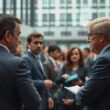Sahra Wagenknecht, soon to depart as leader of the newly formed Basis Social Movement (BSW) party, has escalated the debate surrounding potential government formation following upcoming regional elections, particularly in Saxony-Anhalt. In an interview with Welt television on Monday, Wagenknecht firmly rejected the prospect of broad, multi-party coalitions solely predicated on excluding the Alternative for Germany (AfD) from power, characterizing such arrangements as “idiotic” and explicitly stating BSW’s unwillingness to participate.
Wagenknecht’s critique highlights a growing frustration with the established political landscape’s approach to managing the AfD’s rise. The prevailing strategy of forming unwieldy coalitions to prevent the far-right party from gaining influence, she argues, has proven ineffective and impedes the pursuit of BSW’s stated political objectives. “We’re here to change this country and if we can’s achieve our goals through collaboration with established parties, then our place isn’t in government” she asserted.
Acknowledging the constraints imposed by her party’s opposition to cooperation with the AfD, Wagenknecht has proposed a novel solution: the formation of an expert government. This model would see individuals of recognized expertise appointed to ministerial positions, independent of party affiliation, with legislative decisions determined through ad-hoc majorities. Such a system would necessitate shifting away from the current, often rigid, exclusionary tactics.
Crucially, Wagenknecht indicated a willingness to move beyond established taboos, suggesting that a transition to such a system might also require engaging in dialogue with AfD representatives. While emphasizing the importance of democratic discourse and factual deliberation, she accused opponents of fostering an “hysterical” narrative that equates even minor engagement with the AfD with a looming authoritarian threat. She believes that this overreaction ultimately serves to strengthen the AfD by pushing it further into the political fringes. Her remarks represent a potentially significant shift in the approach to political maneuvering in Germany, though their practical feasibility remains to be seen and is likely to provoke considerable debate across the political spectrum.





